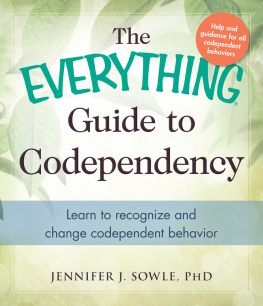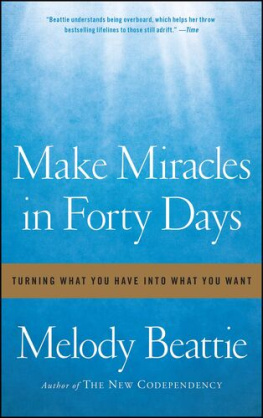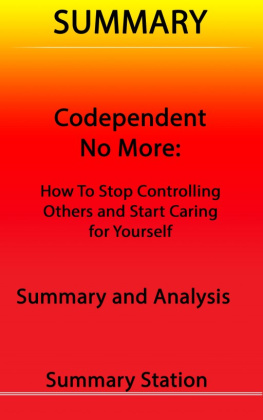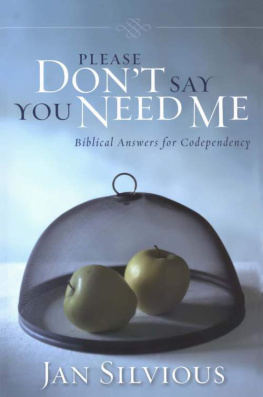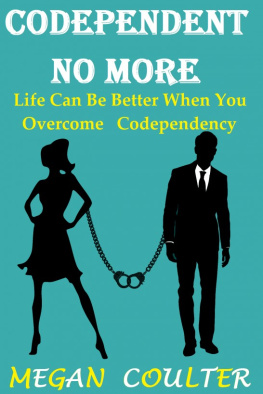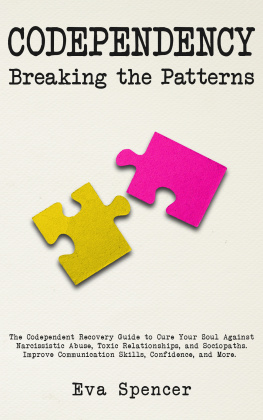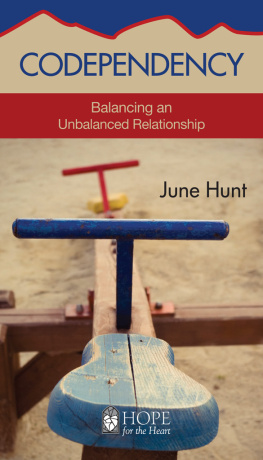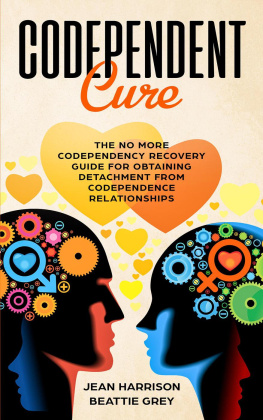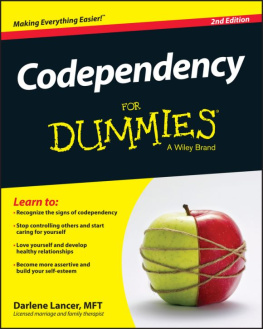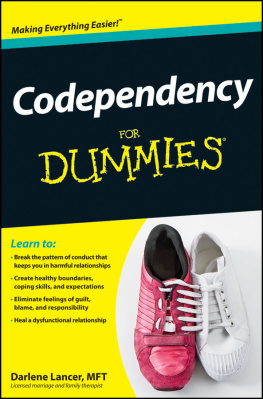THE

GUIDE TO
CODEPENDENCY
Learn to recognize and
change codependent behavior
Jennifer J. Sowle

Avon, Massachusetts
I wish to dedicate this book to my son, Trevor, who is an inspiration to me in many ways.
Contents
The Top 10 Ways to Stop Being Codependent
- Try to identify the shoulds that keep you from setting healthy boundaries for yourself.
- Measure your level of resentment. Resentment comes from doing what you dont want to do, agreeing when you dont mean it, or expecting things from others without telling them.
- Make sure your responses are not intended to control or manipulate another.
- Take a look at your anger patterns. Do you get angry and defensive when others try to discuss a problem they have with you?
- When you think youre being criticized, notice your responses. Do you react by being defensive, devastated, angry, crushed, incredulous, blaming, hostile, too fragile to handle it, etc.?
- When youre asked for your opinion, dont immediately react. Take time to look inside for it, then share.
- Respect others by allowing them to take responsibility for their own lives.
- Identify what you have control over, and act on it. Let go of what you do not have control over.
- Look at your current relationships and make sure youre being authentic. Speak your own truth without fear of anothers judgment or reaction.
- Look back at your family and see if you can identify codependent patterns there. This could help you become aware of your own unconscious patterns.
Introduction
CODEPENDENCY IS A STRANGE word. The prefix co- usually describes two or more components that exist in relationship to one another. And perhaps this word once made more sense back in the 1980s when it described the relationship between an addict and her partner. But that was then and this is now.
This book explains the concept of codependency in all its forms. You will discover that codependency can exist in your mind, as a part of your identity, without co-depending with anyone. And when codependent relationships are analyzed, it means almost all relationships, not just alcoholic ones.
If you went out on the street right now and asked ten people the meaning of codependency, they would likely have ten different answers, or they would have no answer at all! Codependency is one of those terms that everybody uses but few understand.
Codependency is obviously not a flash in the pan; it has endured beyond the fad and fashion of its time. It has cracked out of the shell of addiction and something new has hatched, something that undoubtedly touches you. When youve finished reading this book, you will know more about codependency than 99 percent of the population. You might even see your family, spouse, friends, and coworkers hiding in these pages. And odds are extremely high that you will see yourself!
This book will teach you about codependency and how not to get stuck in it. Here are some of the important ways youll learn to change and move beyond codependency:
- Youll discover patterns in yourself and others.
- Youll find out how to use the results of the Codependency Quizzes.
- Youll develop non-codependent language and communication skills.
- Youll learn to journal and practice new skills at home.
- Youll engage your partner in change.
- Youll find a therapist.
- Youll break the spell of codependency and discover the real you.
The goal of this book is to give you some fairly weighty psychological stuff combined with a mix of personal growth and self-help. The mix is probably 1 cup psychological, 2 cups personal growth, and 2 cups self-help. Most people buy books like this one because they want to make their relationships better. If this is your quest, youve found the right book! You will briefly enter the lives of couples to see what codependency looks like. Then this psychologist will help you adjust your lenses so you wont miss the important parts. And thats how youll learn about codependency.
This book is for you. Use everything in this Everything book to learn about yourself. With your new insights, you can become your own mirror. Recognize your intrinsic value and embrace it!
CHAPTER 1
What Is Codependency?
Codependency is a pattern of thinking, feeling, and behaving. If you are codependent, you are unable to identify and follow your own needs, wants, and feelings. Its as if you have grown antennae, and you wave them as you move through life, straining to pick up vibes from others. If you are codependent, you are not powered from within; your quest for power is through controlling others. In fact, youre so focused on another, you may not even know how you feel or think.
How to Spot Codependency
Consider these pointers before you read the stories that follow. See if you can identify the codependent patterns in the relationships.
HOW DO YOU KNOW IF YOURE CODEPENDENT?
- You like to be in the helping role (which is the power role, by the way).
- You tend to surround yourself with needy people.
- You are too worried about pleasing others.
- You try to be all things to all people.
- You have a self-esteem that is connected to doing.
- You have an overdeveloped sense of responsibility.
- You feel nagging anxiety, pity, or guilt when other people have a problem.
- You are afraid of making mistakes.
- You try to prove youre good enough to be loved.
- You worry about other peoples problems.
- You have difficulty saying no and setting boundaries.
- You seek out chaos, and feel most alive when youre involved in it.
- You wonder why people dont do things for you.
- You feel victimized by the selfishness of others.
- You love to get involved in a crisis, and then complain about it.
- You are easily offended by others who you feel are cold, uncaring, or selfish.
- You get angry when somebody refuses your help or doesnt take your advice.
- You try to be perfect, and expect others to be perfect.
- You blame yourself and put yourself down.
- You must be in control at all times.
Codependents are not always passive, nurturing, and loving. The caregiver, the peacemaker, the guy who will give you the shirt off his back can be codependent. But so can those who are manipulative and angry, resentful and cranky. If you consider the core issuea codependent person relies on the perceptions of others to tell her she is okayyou can see how vital anothers opinion can be. Like Blanche DuBois in the play A Streetcar Named Desire, the codependent relies on the kindness of strangers. What a powerless position this is.

In 1987, Melody Beattie wrote the remarkable Codependent No More: How to Stop Controlling Others and Start Caring for Yourself. In her work, Beattie emphasized that alcoholism is a family disease, and she identified the codependent role played by the partner of an alcoholic. Since that time, the term has generalized to describe any person who focuses on anothers life to the detriment of his or her own.

